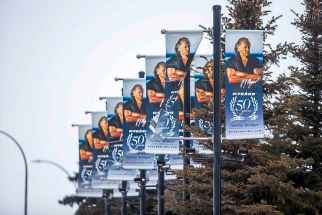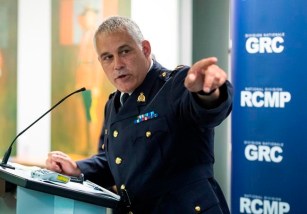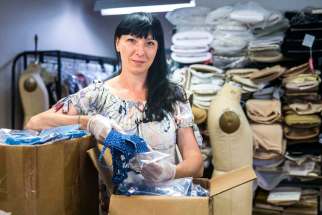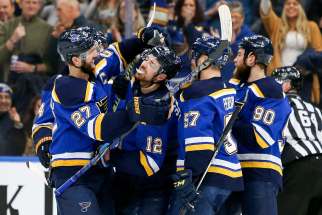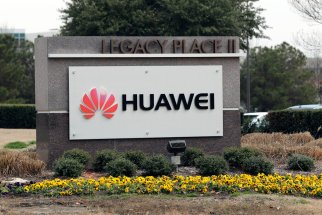NHL shuffling toward resumption of play Slip-ups like St. Louis's could derail process
Read this article for free:
or
Already have an account? Log in here »
To continue reading, please subscribe:
Monthly Digital Subscription
$0 for the first 4 weeks*
- Enjoy unlimited reading on winnipegfreepress.com
- Read the E-Edition, our digital replica newspaper
- Access News Break, our award-winning app
- Play interactive puzzles
*No charge for 4 weeks then price increases to the regular rate of $19.00 plus GST every four weeks. Offer available to new and qualified returning subscribers only. Cancel any time.
Monthly Digital Subscription
$4.75/week*
- Enjoy unlimited reading on winnipegfreepress.com
- Read the E-Edition, our digital replica newspaper
- Access News Break, our award-winning app
- Play interactive puzzles
*Billed as $19 plus GST every four weeks. Cancel any time.
To continue reading, please subscribe:
Add Free Press access to your Brandon Sun subscription for only an additional
$1 for the first 4 weeks*
*Your next subscription payment will increase by $1.00 and you will be charged $16.99 plus GST for four weeks. After four weeks, your payment will increase to $23.99 plus GST every four weeks.
Read unlimited articles for free today:
or
Already have an account? Log in here »
Hey there, time traveller!
This article was published 06/07/2020 (1984 days ago), so information in it may no longer be current.
Did you hear the one about the hockey players who walked into a bar?
Unfortunately, this isn’t the beginning of a corny joke, but rather a real-life reminder that COVID-19 is no laughing matter despite far too many treating it as such. And the best-laid plans of the NHL and NHLPA to return to play this summer — spelled out in an tentative agreement following weeks of around-the-clock negotiations — could quickly come undone if the participants can’t help themselves and get out of their own way.
Take the Stanley Cup-champion St. Louis Blues, who had to shutter their voluntary team skates last weekend after a trip to a local watering hole was linked to four unnamed players and a coach testing positive for the virus.
Nice going, guys. Was that swill you call beer really worth it? They join a growing list of players to become infected that now stands at 35 (23 who are participating in Phase 2 skates in their home markets and 12 who have been working out independently). According to the league’s own numbers, that’s an infection rate of about 5.5 per cent, which is significant. (Manitoba’s is 0.2 per cent, while the national rate is 0.8)
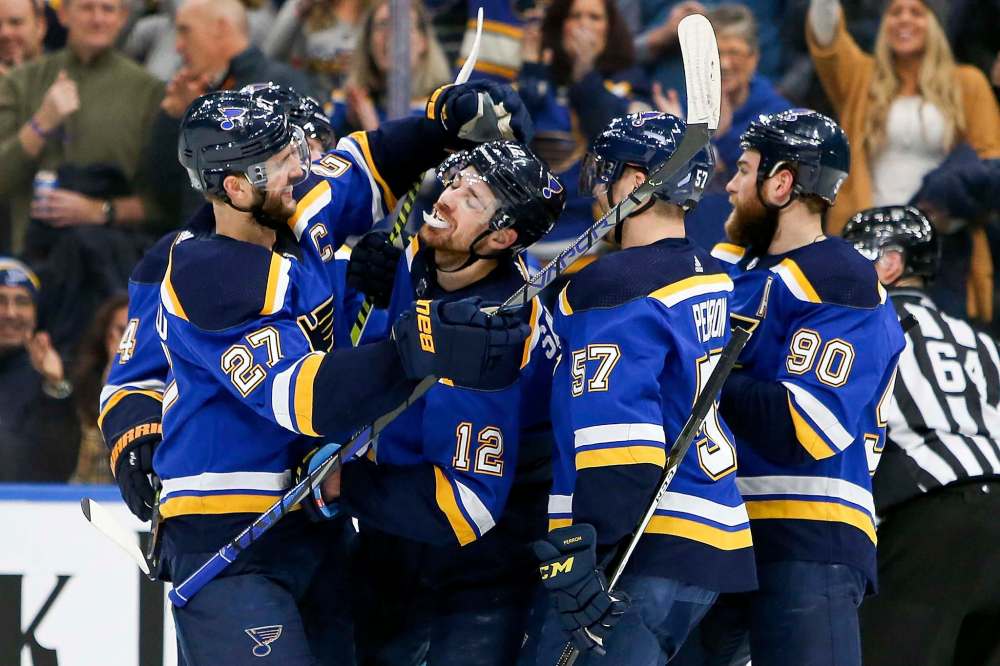
To be clear, no rules have been broken — yet. Players won’t be living in a so-called bubble until they get to the hub cities of Toronto and Edmonton later this month in advance of the 24-team playoff tournament to be played without fans. For now, they’re free to move about their communities, although in the recent example of the Blues you’d think common sense would tell them to avoid potential hotspots such as a crowded lounge, especially in a state such as Missouri where the curve is still growing.
But therein lies the rub. It’s not going to be easy to get hundreds of wealthy young men to dramatically change the lifestyle they’ve grown quite comfortable with for an extended period of time, no matter how many health and safety guidelines are in place. The sports adage ‘If you ain’t cheating, you ain’t trying’ likely applies to more than just their mindset while on the ice, but in this case, they’re risking a lot more than getting whistled for a two-minute penalty.
Some of these rules are going to feel downright Orwellian, and you wonder just how close the ratification vote expected later this week is going to be. I expect the majority will give it a reluctant thumbs up just because the alternative may be even worse, but plenty of voters might be holding their noses. And some may choose to opt out, as we’re starting to see in the complete debacle that is Major League Baseball.
Who’s going to be the NHL’s version of David Price, Nick Markakis, Ian Desmond and Ryan Zimmerman, ball players who have officially said “no, thanks” to a return to the diamond this summer? There may be veteran NHLers who already have financial security in the form of lucrative, long-term contracts, combined with loved ones at home they risk not seeing for a couple months, who decide it’s just not worth it.
They have until three days after ratification, expected to be just in time for training camps to begin Monday, to decide.
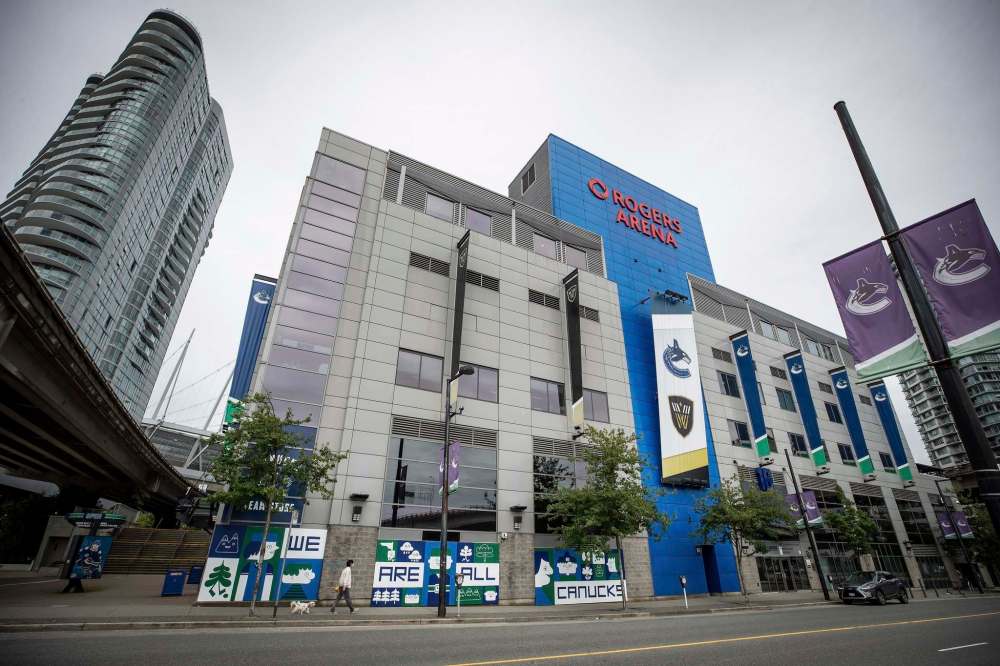
According to the tentative agreement, each team will be assigned one floor of the hotel that will serve as their hockey home. They won’t be allowed to go in anyone’s room but their own. Housekeeping will be — gasp! — every third day only. Masks must be worn at all times outside their rooms except when eating, drinking, working out or playing. Families will only be allowed into the bubble for the Conference finals and Stanley Cup final.
Everyone will be tested daily via a nasal swab, which isn’t exactly a picnic. That includes all members of a team, including coaches and support staff. The same goes for those who have frequent contact with the players, including all hotel and rink staff who will not be living in the bubble and risk bringing infection into it.
That could mean upwards of 2,000 tests per day will be be administered in the early stages of the playoffs. This won’t come cheap to the NHL, but it’s a price the league is willing to pay in an attempt to salvage the season and at least honour existing broadcast agreements.
A positive test means immediate isolation for the individual, and the NHL isn’t saying how many infections they’re willing to live with. Only after two subsequent negative tests, or 10 days in quarantine, will a player be allowed back into the fold. Anyone who has what the NHL describes as close contact with a positive player or staff member — 15 minutes or longer at two metres or less — will be immediately removed and tested, but can still play provided the results come back negative and the individual is asymptomatic.
This was apparently a key concession Vancouver was unwilling to make, which took them out of the running as a hub city. B.C. requires the close contacts of a person who has tested positive to also quarantine for two weeks regardless of test results, which could quickly tank the whole tournament as soon as a handful of players get sick. Alberta still does, too, for everyone except NHL players. I wonder how players feel about going into an environment that has deliberately been made less safe for their convenience?
All of this may explain why the NHL had to dangle a few juicy carrots, including an extension of the collective bargaining agreement that guarantees Olympic participation in 2022 and 2026. The playoff bonus pool is also doubling from US$16 million to US$32 million. Since all players have been paid their full 2019-20 salaries, save for their final cheques, this is the only immediate payoff to playing. (Between US$20,000 each for losing the best-of-five qualifying round series to US$240,000 each for winning the Cup).
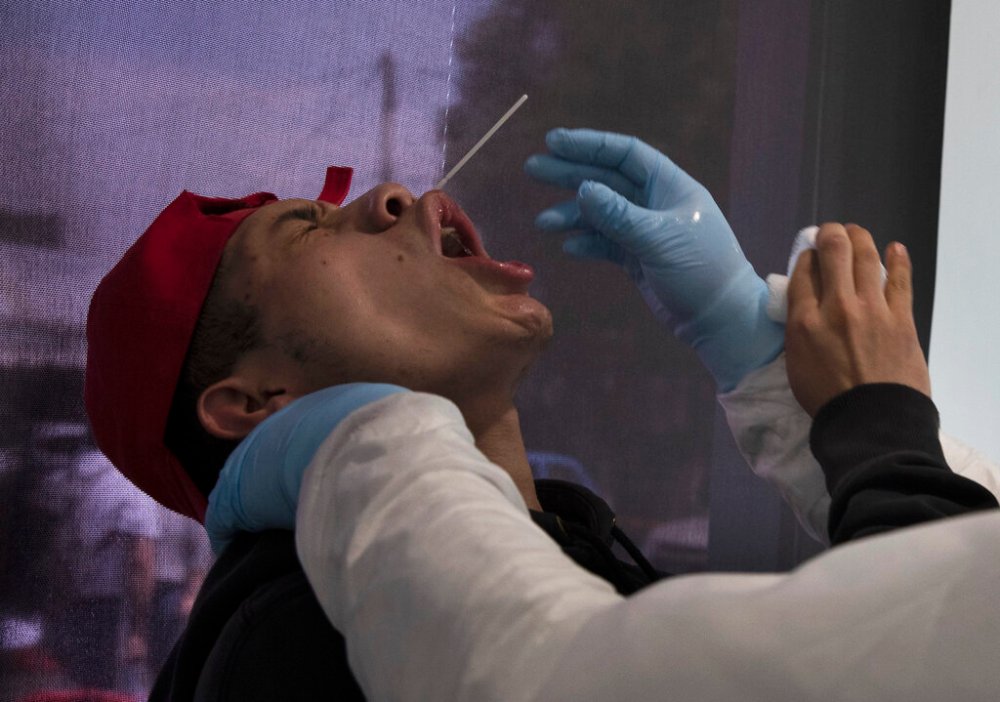
Additional “perks” include the use of hotel pool and fitness facilities with social-distancing regulations in place, room service and delivery from several local restaurants, and organized team excursions to golf courses. The league will also help families of players who are stuck at home with grocery delivery and other errands.
Give the NHL credit for coming up with a detailed plan that at least gives the league a fighting chance of dropping the puck for the most unique playoffs we’ll ever see. Hopefully those involved take it seriously because there would be nothing funny about the hockey players who had to walk into a hospital.
mike.mcintyre@freepress.mb.ca
Twitter: @mikemcintyrewpg

Mike McIntyre grew up wanting to be a professional wrestler. But when that dream fizzled, he put all his brawn into becoming a professional writer.
Our newsroom depends on a growing audience of readers to power our journalism. If you are not a paid reader, please consider becoming a subscriber.
Our newsroom depends on its audience of readers to power our journalism. Thank you for your support.

